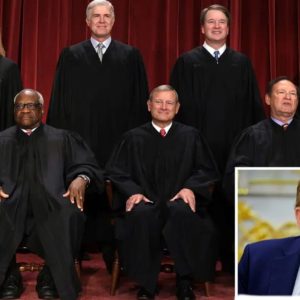The Supreme Court has recently authorized the Trump administration to deport a group of eight immigrants currently detained at a U.S. military base in Djibouti to South Sudan, marking a pivotal development in America’s evolving immigration enforcement landscape. The Court’s brief, unsigned opinion, issued Friday, affirmed that an earlier stay of a Massachusetts federal judge’s order applies in full to this case, effectively allowing the administration to proceed with the removals despite lower court restrictions. This decision underscores the contentious legal terrain surrounding “third-country” deportations, a practice whereby immigrants can be sent to nations other than their countries of origin. The ruling signals a broad expansion of executive authority in immigration matters, reflecting the Court’s increasing willingness to defer to the government’s discretion on matters deemed sensitive to national security and foreign policy. By overriding lower court protections designed to shield individuals from deportation to potentially dangerous environments, the decision has reignited a national debate over the balance between humanitarian obligations and the enforcement prerogatives of the executive branch.
The legal background of this case stretches back several months, highlighting the complex interplay between judicial oversight and executive power. On April 18, U.S. District Judge Brian Murphy barred the federal government from deporting individuals to third countries unless it first implemented procedural safeguards ensuring that deportees would not face torture upon their return. The order was grounded in both domestic law and international obligations, particularly the United Nations Convention Against Torture, which prohibits sending individuals to countries where they are likely to be subjected to severe mistreatment. When the Trump administration attempted to deport eight men to South Sudan in apparent violation of that order, Murphy issued another ruling on May 21, emphasizing the illegality of the action and noting the extreme risks posed by South Sudan’s ongoing instability. At the time, the African nation was grappling with armed conflict, kidnappings, and pervasive insecurity, raising profound humanitarian concerns. In response, the deportation flight was diverted to Djibouti, where the immigrants have remained under U.S. military custody, creating a legal limbo and attracting widespread attention from human rights organizations.
In seeking relief from Judge Murphy’s injunction, the Trump administration appealed to the Supreme Court on May 27, arguing that the lower court’s requirements had disrupted the federal government’s immigration enforcement processes and compromised sensitive diplomatic operations. Solicitor General D. John Sauer contended that Murphy’s procedures were creating “havoc” in the deportation system and preventing the administration from exercising lawful discretion. By contrast, the attorneys representing the detained immigrants maintained that Murphy’s ruling did not prohibit deportations outright but merely required compliance with statutory protections designed to prevent torture or other inhumane treatment. The dispute illustrates the broader tension between two foundational principles of U.S. governance: the executive branch’s authority to enforce immigration law and the judiciary’s responsibility to ensure that governmental actions comply with domestic and international human rights standards. For the immigrants involved, the legal wrangling has immediate and potentially life-threatening consequences, as decisions over procedural technicalities carry the weight of human survival.
The Supreme Court’s initial stay of Murphy’s injunction on June 23 left uncertainty about whether the ruling applied to the eight individuals detained in Djibouti. Judge Murphy maintained that his May 21 decision still protected them, prompting the administration to return to the Court, accusing him of “unprecedented defiance” of its authority. In the latest order, the justices clarified that the stay indeed suspended Murphy’s injunction fully, rendering subsequent lower court rulings unenforceable and effectively permitting the administration to proceed with the removals while litigation continues. This ruling reflects the Court’s tendency to prioritize executive discretion in areas traditionally seen as within the purview of the federal government, particularly those involving foreign policy and immigration enforcement. It also highlights the challenges courts face in balancing procedural safeguards for vulnerable individuals against the perceived need for administrative efficiency in matters involving international movement and national security.
The decision has exposed ideological divides within the Supreme Court and sparked debate over the broader implications of third-country deportations. While the unsigned majority opinion was supported by the Court’s conservative justices, Justice Elena Kagan noted her personal disagreement with the initial decision to permit such deportations but recognized that the stay order prevented lower courts from enforcing contrary rulings. By contrast, liberal justices Sonia Sotomayor and Ketanji Brown Jackson dissented strongly, with Sotomayor warning that the majority’s decision could result in the immigrants being “turned over to local authorities without regard for the likelihood that they will face torture or death” in South Sudan. Her dissent also criticized the Court for a lack of transparency in its reasoning, arguing that the justices failed to adequately explain their decisions while faulting lower courts for allegedly misinterpreting the ruling. The case thus illuminates deep tensions between judicial restraint and activist oversight, and it raises pressing questions about the Court’s role in protecting individuals from human rights abuses in the context of immigration enforcement.
Beyond the immediate legal arguments, the ruling carries profound humanitarian and policy implications. The eight men—believed to hail from Cuba, Vietnam, and Laos—remain in legal and physical limbo, their fate now contingent on executive discretion rather than protective judicial procedures. Critics of the decision argue that third-country deportations exacerbate the vulnerability of already marginalized populations, effectively transferring responsibility for safety and protection to nations with minimal capacity to safeguard human rights. Supporters contend that the ruling restores necessary flexibility for the administration to manage complex immigration and security matters, arguing that bureaucratic constraints from lower courts can impede timely, coordinated action. The case exemplifies broader debates in the United States about how to reconcile national security, border control, and foreign policy imperatives with ethical obligations toward noncitizens, particularly in situations where international law warns against returning individuals to life-threatening conditions.
Ultimately, the Supreme Court’s ruling signals a significant shift toward deference to executive authority in immigration enforcement while leaving unresolved questions about the protection of human rights. By granting the Trump administration authority to proceed with the removals, the Court has emphasized the primacy of executive discretion over lower-court judicial oversight, particularly in cases intersecting with foreign policy and diplomatic considerations. As the legal and moral controversies surrounding this case continue to unfold, it serves as a stark reminder of the tension between safeguarding national interests and adhering to humanitarian commitments under domestic and international law. The ultimate resolution will not only determine the fate of the eight detainees but also set a precedent for the treatment of vulnerable immigrants in third-country deportations, potentially shaping U.S. immigration policy for years to come. Observers, activists, and policymakers alike will be closely watching the ongoing litigation and its broader implications, as the nation grapples with one of the most complex intersections of law, morality, and power in recent history.





